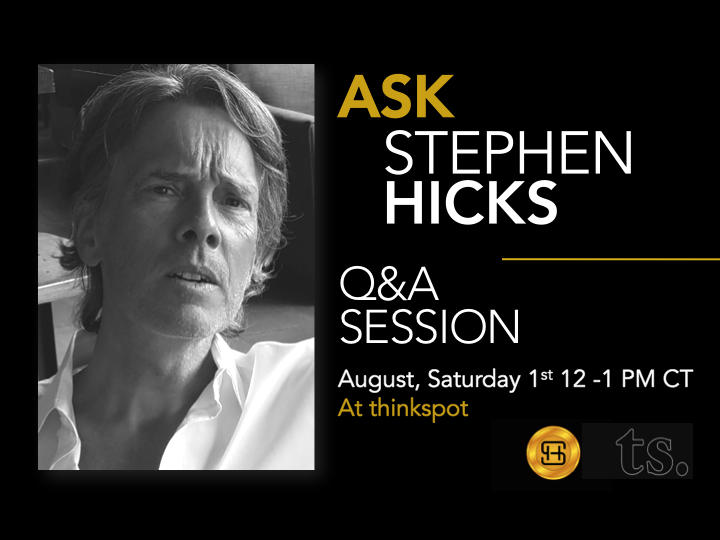Questions for August 2020 Q&A at thinkspot:
SLAVERY
1. What do you know about the abolition of slavery in Brazil? How did it happen?
2. I doubt that your last presentation is anything like what has been taught in the American educational system. How can we stop the ideologically possessed from indoctrinating a dangerous one-sided narrative In our children’s education? How can we require public education to include critical thinking and to encourage debating very different points of view?
3. What if any amount of taxation and the accompanying punishment for non-compliance would you consider involuntary servitude? Individual Rights
4. What are your thoughts on Islam banning slavery in the early 8th century? Fisheyedlens
5. The role of religion had less of an impact on slavery than it could have only because the Church was losing its authority over the masses and economics were becoming more important. I could go on about the role of the Church in the West in ushering in the Scientific Revolution, but that’s not the point of my comment, only for background to the Western development of reason and rationalist thinking which led to the abolitionist movement. Slavery was a normal part of ancient life. So what caused it to become something of a moral movement to end it? Does religion play a significant role in it? King Charles I of Spain, usually known as Emperor Charles V, was following the example of Louis X of France, who had abolished slavery within the Kingdom of France in 1315. He passed a law which would have abolished colonial slavery in 1542, although this law was not passed in the largest colonial states, and it was not enforced as a result. From 1435 to 1890, we have numerous bulls and encyclicals from several popes written to many bishops and the whole Christian faithful condemning both slavery and the slave trade. The date of the first Bull from 1435 is very significant. Nearly 60 years before the Europeans were to find the New World, we already had the papal condemnation of slavery as soon as this crime was discovered in one of the first of the Portuguese geographical discoveries. But here was obviously widespread non-acceptance on the part of Catholic clergy and laity. The prevalent attitude of the American hierarchy, with some notable exceptions in both directions, was that many aspects of slavery were evil, but that to change the law would be, practically speaking, a greater evil. It was decided that papal pronouncements against slavery, particularly Gregory XVI’s , did not apply to the institution as it existed in the United States, thus yielding on this issue a sort of Americanized Gallicanism. England interpreted that Gregory XVI was condemning only the slave trade and not slavery itself, especially as it existed in the United States. England evidently felt justification for this dissent lay in the episcopal (mis)interpretation of. These arguments are not dissimilar to the widespread dissent from the Church’s teachings against slavery by bishops, priests and laity that was common from the 17th to 19th centuries. For the Catholics of the United States—as for Catholics everywhere—there was the consistent, historical teaching of the Church, as presented through Eugene IV. Pius II, Paul III, Gregory XIV, Urban VIII, Innocent XI, Benedict XIV, Pius VII and others. For the early 19th century, in the midst of the volatile decades before the Civil War, Gregory XVI issued , with its clear condemnation of both the slave trade and slavery itself. Since that Constitution mentioned the documents of the previous pontiffs, it is hard to understand how the American hierarchy was not aware of the consistency of the teaching and its nature. All of these teachings, nonetheless, went unknown to the Catholic faithful of the U.S., perhaps through willful ignorance, or were explained away by many of the American bishops and clergy. Thus, we can look to the practice of dissent from the teachings of the Papal Magisterium as a key reason why slavery was not directly opposed by the Church in the United States. Perhaps religion gave our ancestors a moral and ethical consideration but it was resisted for a long time due to economic factors and that obviously was the stronger pull than religious considerations.
SOCIALISM
6. A comment that I’m not certain how to answer is their accusation that the reason Socialist countries (E.g. Cuba, Venezuela) are poor because the USA and western countries prevent them from trade so the west are responsible for their troubles. Is there any truth to that?
FREE WILL AND POSTMODERNISM
7. How does the “free will vs. determinism” dichotomy relate to Postmodernism and how do you see the implications of that relationship potentially affecting the legal underpinnings of Western Culture in the future?
HISTORY
8. Do you think the Plague at the end of the Dark Ages helped bring about the Renaissance and the Enlightenment?
ETHICS
9. “What reason is there for us to be ethical?”
Join here.

Greetings, do you see a link between rising affluence and and a decline in the injunction of ‘Love thy neighbor as thyself’?
Good question. I’ll add it for my next Q&A session at thinkspot.